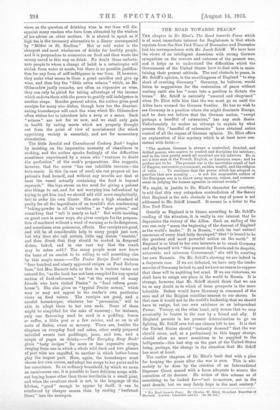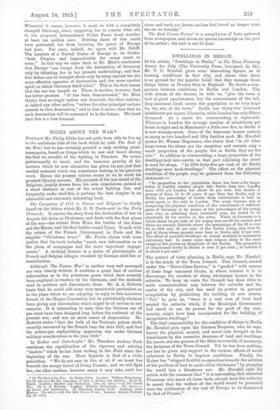THE ROAD TOWARDS PEACE.* THE chapter in Dr. Eliot's The
Road towards .Peace which is of most immediate interest for Englishmen is that which reprints from the New York Times of November,and December lasthis correspondence with Mr. Jacob Schiff. We have here the views of an intelligent American with strong German sympathies on the sources and outcome of the present war, and it helps us to understand the difficulties which the Government of the United States have to deal with in main- taining their present attitude. The real obstacle to peace, in Mr. Schiff's opinion, is the unwillingness of England "to stop short of crushing Germany." Germany, he believes, would listen to suggestions for the restoration of peace without waiting until she has "come into a position to dictate the terms." Mr. Schiff is naturally "amazed and chagrined" when Dr. Eliot tells him that the war must go on until the Allies have crossed the German frontier. He has no wish to see Germany in a position where she might dominate Europe, and he does not believe that the German nation, "except perhaps a handful of extremists," has any such desire. Unfortunately he makes no attempt to explain by what process this "handful of extremists" have obtained entire control of all the organs of German opinion. Dr. Eliot offers an explanation of this mystery which is at least more con- sistent with facts :— " The modern Gorman is always a controlled, directed, and drilled person, who aspires to control and discipline his inferiors ; and in his view pretty much all mankind are his inferiors. Ile, is not a free man in the French, English, or American sense; and he prefers not to be. The present war is the inevitable result of lust of Empire, autocratic government, sudden wealth, and the religion of valor. . . . To maintain that the power which has adopted in practice that new morality . . . is not the responsible author of the European war is to throw away memory, reason, and common- sense in judging the human agencies in current events."
We ought, in justiee to Dr. Eliot's character for courtesy, to add that this very outspoken contradiction of the theory that England is the sole obstacle in the way of peace is not addressed to Mr. Schiff himself. It occurs in a letter to the New York Times.
Greatly as England is to blame, according to Mr. Schiff's reading of the situation, it is really in our interest that he deprecates the victory of the Allies. Such an ending of the war can only "mean the beginning of the descent of England as the world's leader." It is Russia, "with its vast natural resources of every kind fully developed," that "is bound to be the greatest and most powerful nation on the earth." If England is so blind to her own interests as to crush Germany and ally herself with "this present-day Russia and its despotic, autocratic, and inhuman Government," she will be courting her own Nemesis. On Mr. Schiff's showing we are indeed in a desperate case. If we are defeated, we have only the tender mercies of Germany to look to, and we have no reason to suppose that these will be anything but cruel. If we are victorious, we shall have to resign our place in the world to Russia. It is strange, however, that Mr. Schiff should think that we can be in any doubt as to which. of these prospects is the more tolerable, Defeat would leave Germany in command of the seas and of the Belgian coastline nearest to our shores. In that case it would not be the world's leadership that we should have to resign, but our own existence as an independent Power. Victory, on the other hand, only means that we may eventually be beaten in the race by a friend and ally. If England persists in her present determination to go on fighting, Mr. Schiff sees but one chance left to her. It is that the United States should "instantly demand" that the war should cease, and, as a preliminary to this happy ohange, should allow no more munitions to be supplied to the belligerents—this hist step on the part of the United States being, perhaps, the change in the situation that Mr. &shift has most at heart.
The earlier chapters of Dr. Eliot's book deal with a plan for keeping the peace after the war is over. This is ulti- mately to be done by the creation of an International Supreme Court armed with a force adequate to secure the execution of its decrees. He writes of this scheme as of something to be looked for—"not to-morrow, not in the next decade, but we may fairly hope in the next century."
" The Road towards Peace. By Charles IT. Eliot, Praldent Emeritus of
Harvard. London: Constable and Co. f42. Od. not, 2 . ' •
Whenever it comes, however, it must be with a completely changed Germany, since, supposing her to remain what she is, the proposed International Police Force must number at least ten million men. Nothing short of this could have prevented her from breaking the peace of Europe last year. For once, indeed, we agree with Mr. Schiff. The creation of a United States of Europe is, he thinks, "both Utopian and impracticable for many years to come." In this way we come back to Dr. Eliot'a conclusion that Europe "can escape from the domination of Germany only by defeating her in her present undertaking; and that this defeat can be brought about only by using against her the same effective agencies of destruction and the same martial spirit on which Germany itself relies." This is the first lesson that the war has taught us. There is another, however, that luus better promise. "It has been demonstrated," Dr. Eliot thinks, that no single nation can dominate the other nations, or indeed any other nation, "unless the other principal nations consent to that domination," and to him it seems clear that no such domination will be consented to in the future. We trust that this is a true forecast.



































 Previous page
Previous page